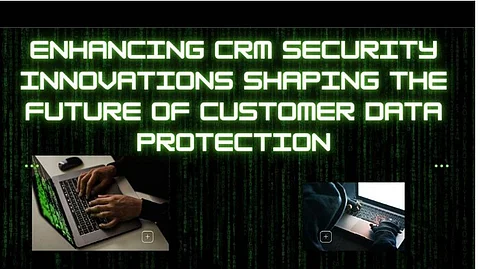

Customer Relationship Management (CRM) systems have evolved into essential tools for businesses, storing vast amounts of sensitive customer data. In his research, Dinesh Rajasekharan explores the critical role of data security in CRM systems and the latest innovations ensuring the protection of customer information. With technological advancements, CRM platforms now integrate cutting-edge security frameworks to address emerging threats while maintaining efficiency.
The digitalization of customer interactions has led to an increased risk of data breaches, making CRM security a top priority for organizations. Businesses must safeguard customer data while ensuring seamless access for authorized users. This dual requirement has driven the adoption of advanced security technologies, ensuring compliance with regulatory standards and maintaining customer trust.
Encryption plays a vital role in protecting CRM data from unauthorized access. Modern CRM platforms utilize both symmetric and asymmetric encryption techniques to secure data in transit and at rest. Strong encryption algorithms, coupled with effective key management systems, ensure that sensitive customer information remains inaccessible to cyber threats.
Tokenization maintains a secure vault where original data is stored, while tokens serve as non-sensitive references throughout the CRM ecosystem. This approach offers several advantages beyond encryption, including compliance with regulations like PCI DSS and GDPR with less computational overhead. Modern tokenization solutions incorporate format-preserving techniques, ensuring tokens mimic the structure of original data to maintain application compatibility. When implemented with proper token mapping, vault security, and token lifecycle management, organizations can achieve stronger data protection while preserving analytical capabilities and user experience across their customer relationship workflows.
CRM platforms have built a multi-factor authentication feature into their security features. Such authentication is done in such a way that it should be possible to provide several ways to authenticate an individual, whether they are fingerprinting or entering a password or token provided by an external source. This would enhance security without making it less usable.
The modern MFA is fully componentized into the CRM work through hard-key, mobile applications, and adaptive authentication approaches that change the rules according to risk context. Benefits for organizations while maintaining productivity will have less disruption in the event of account compromise. Authorized users get authentication streams across multiple touch points and channels with strong security perimeter shielding sensitive customer data from credential-based attacks when implemented with single sign-on features.
As CRM systems grow steadily integrated with third-party applications, securing the APIs has come to be an important issue. Authentication methods such as OAuth 2.0 will guarantee that the interchange of data between platforms is safeguarded. Monitoring the APIs and rate-limiting requests also helps secure breaches by detecting suspicious activities in real time and blocking them.
Compliance automation systems have become necessary among CRM tools to be able to work through the complex networks that regulate a given environment. These technologies check the system's setups to ensure that security measures focus on compliance with data protection regulations such as the CCPA and GDPR. Due to the automation of compliance processes, an organization may obtain a reduced risk of being non-compliant while maintaining operational efficiency.
Artificial Intelligence is changing the face of CRM security by facilitating real-time detection and responses to threats. Anomaly identification in user behavior, breach discovery, and automatic security responses are all enabled by AI-based analytics solutions. With this proactive approach, businesses can avoid risk escalation into a sizable security incident.
A complete logging mechanism along with a Security Information and Event Management (SIEM) system permits an organization to observe and act on security events in real time. These systems gather data from several sources within the CRM infrastructure, aiding in effectively discovering and responding to possible threats. High-end SIEM solutions utilize machine learning so the systems can learn from past operator actions and enhance their accuracy and lower false alarms.
The backbone of the backup and recovery system is protecting CRM data from cyber threats and system failure. Modern backup solutions, using cloud storage and immutable backup technologies, guarantee data integrity and speedy recovery when an incident occurs. Regular backup tests keep improving the resilience against data loss. Regular backup testing further strengthens resilience against data loss.
As online risks evolve, CRM security measures will be put into place. Blockchain-based security, quantum-safe encryption, and other AI-driven security innovations are examples of possible breakthroughs. Organizations are called upon to stay in sync with the emerging threats by continuously updating their security frameworks and adopting innovative protective measures.
In fact, CRM has since ceased to be corollary in the organization and now forms the core of customer data management. So it has future-proofed its application in advanced encryption, tokenization, AI-based threats detection, and compliance automation towards effectively safeguarding customers' information. According to Dinesh Rajasekharan, these innovations are necessary to trust and keep integrity in a more digital and less human world.
